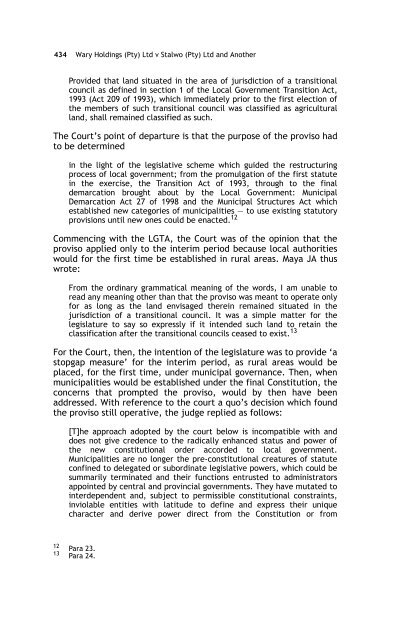The decision in Wary Holdings (Pty) - PULP
The decision in Wary Holdings (Pty) - PULP
The decision in Wary Holdings (Pty) - PULP
Create successful ePaper yourself
Turn your PDF publications into a flip-book with our unique Google optimized e-Paper software.
434 <strong>Wary</strong> Hold<strong>in</strong>gs (<strong>Pty</strong>) Ltd v Stalwo (<strong>Pty</strong>) Ltd and Another<br />
Provided that land situated <strong>in</strong> the area of jurisdiction of a transitional<br />
council as def<strong>in</strong>ed <strong>in</strong> section 1 of the Local Government Transition Act,<br />
1993 (Act 209 of 1993), which immediately prior to the first election of<br />
the members of such transitional council was classified as agricultural<br />
land, shall rema<strong>in</strong>ed classified as such.<br />
<strong>The</strong> Court’s po<strong>in</strong>t of departure is that the purpose of the proviso had<br />
to be determ<strong>in</strong>ed<br />
<strong>in</strong> the light of the legislative scheme which guided the restructur<strong>in</strong>g<br />
process of local government; from the promulgation of the first statute<br />
<strong>in</strong> the exercise, the Transition Act of 1993, through to the f<strong>in</strong>al<br />
demarcation brought about by the Local Government: Municipal<br />
Demarcation Act 27 of 1998 and the Municipal Structures Act which<br />
established new categories of municipalities — to use exist<strong>in</strong>g statutory<br />
provisions until new ones could be enacted. 12<br />
Commenc<strong>in</strong>g with the LGTA, the Court was of the op<strong>in</strong>ion that the<br />
proviso applied only to the <strong>in</strong>terim period because local authorities<br />
would for the first time be established <strong>in</strong> rural areas. Maya JA thus<br />
wrote:<br />
From the ord<strong>in</strong>ary grammatical mean<strong>in</strong>g of the words, I am unable to<br />
read any mean<strong>in</strong>g other than that the proviso was meant to operate only<br />
for as long as the land envisaged there<strong>in</strong> rema<strong>in</strong>ed situated <strong>in</strong> the<br />
jurisdiction of a transitional council. It was a simple matter for the<br />
legislature to say so expressly if it <strong>in</strong>tended such land to reta<strong>in</strong> the<br />
classification after the transitional councils ceased to exist. 13<br />
For the Court, then, the <strong>in</strong>tention of the legislature was to provide ‘a<br />
stopgap measure’ for the <strong>in</strong>terim period, as rural areas would be<br />
placed, for the first time, under municipal governance. <strong>The</strong>n, when<br />
municipalities would be established under the f<strong>in</strong>al Constitution, the<br />
concerns that prompted the proviso, would by then have been<br />
addressed. With reference to the court a quo’s <strong>decision</strong> which found<br />
the proviso still operative, the judge replied as follows:<br />
[T]he approach adopted by the court below is <strong>in</strong>compatible with and<br />
does not give credence to the radically enhanced status and power of<br />
the new constitutional order accorded to local government.<br />
Municipalities are no longer the pre-constitutional creatures of statute<br />
conf<strong>in</strong>ed to delegated or subord<strong>in</strong>ate legislative powers, which could be<br />
summarily term<strong>in</strong>ated and their functions entrusted to adm<strong>in</strong>istrators<br />
appo<strong>in</strong>ted by central and prov<strong>in</strong>cial governments. <strong>The</strong>y have mutated to<br />
<strong>in</strong>terdependent and, subject to permissible constitutional constra<strong>in</strong>ts,<br />
<strong>in</strong>violable entities with latitude to def<strong>in</strong>e and express their unique<br />
character and derive power direct from the Constitution or from<br />
12<br />
Para 23.<br />
13 Para 24.

















